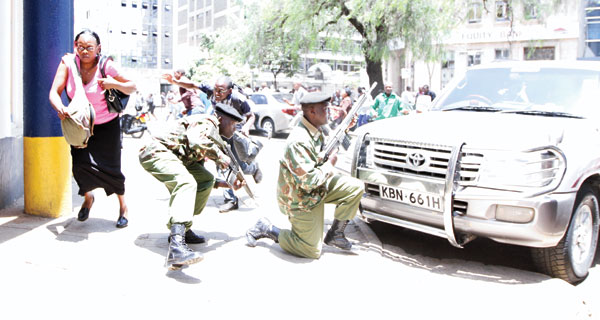 |
|
Woman seeks cover during a police thug shoot out in Nairobi PHOTO: COURTESY |
By JOE KIARIE
Nairobi, Kenya: Armed thugs and petty criminals have invaded streets in Nairobi, bringing to an end a long spell when people could feel safe in once dangerous alleyways.
The criminals, who operate in daylight and at night, have taken over the streets following neglect that has left lights off and street families loitering again. Some of these so-called street families are actually gangs of petty thugs, according to inquiries by The Standard on Saturday.
Several years ago, people could hardly talk on their mobile phones along streets like Tom Mboya.
But following a street lighting programme and efforts to remove thugs and street families, security improved and businesses opened in areas few would have ventured before.
However, traders and other people we spoke to said security has deteriorated in recent months, underlining the huge task facing security chiefs in the capital and around the country. The thugs are so daring that they are also operating in upmarket streets like Kenyatta Avenue.
While the US and UK governments, and even the UN, warn their visitors to avoid carrying huge sums of money and wearing jewelery while on Nairobi streets, a website frequented by tourists worldwide for travel information now advises visitors to wear money belts that fit under their clothes while in the city.
And according to Nairobi County Police Commander Benson Kibue, up to four people are lynched in the city every week, a figure he terms alarming.
Curious onlookers
Henry Ochieng says his vehicle was broken into last Saturday, minutes after he parked it outside I&M building on Kenyatta Avenue and walked into an adjacent supermarket.
When he strolled out minutes later, he was stunned to find two doors of his saloon car wide open. Convinced he had used the remote central lock to secure the vehicle upon alighting, he checked again to find the car had been broken into.
The thugs made away with among other valuables two laptop computers, an external hard disk and a briefcase containing crucial personal documents.
“This still puzzles me. It was in broad daylight and many people, including private security guards, were in the area but none admitted seeing the crime happen,” says Ochieng, a senior officer working for an NGO.
Ochieng’s experience is, however, less traumatising compared to colleague Kurian Musa’s ordeal at the hands of thugs the previous night. The journalist was on his way home at around 10pm when he was attacked by thugs in the heart of the city.
“I had just crossed Moi Avenue walking toward Hotel Ambassadeur when a man suddenly grabbed and tried to wrestle me to the ground,” recalls Musa.
Stay informed. Subscribe to our newsletter
“I counter-attacked but before I could overpower him, another joined in from across the street and knocked me flat to the ground”.
He helplessly watched as the goons ransacked his pockets and made away with his phone, a Nokia Asha.
Somehow, they did not find his wallet, saving him loss of cash and vital documents.
“They casually walked away as curious onlookers stared at me. I approached a private guard who was saw the robbery for assistance since the thieves were still in the vicinity; but he did not utter a word,” states Musa, who reported the incident at Riruta Police Station the next morning.
Smash-and-grab
A university student who was also violently robbed by a five-man gang in the same vicinity recently questions the reluctance by police to ‘finish off’ criminals who are freely terrorising people.
The three are just a fraction of individuals who have fallen victim to a crime wave that has rocked the Nairobi central business district in recent months.
From daylight shootouts to frequent muggings, the city centre is fast degenerating into a gangster’s den. Vulture-eyed pickpockets and muggers targeting pedestrians roam every city corner while smash-and-grab attacks targeting motorists are equally on the rise. A puzzle to most victims is that the criminals, who range from seemingly experienced thieves to impulsive vandals, operate with a high degree of impunity.
It is not surprising to even find the families pitching camp next to bank entrances and ATM machines, vantage points they are likely to exploit to identify and track those who withdraw cash.
The flooding of hawkers along city streets has equally been identified as a possible factor, with felons who would otherwise keep off the city now easily accessing it while disguised as vendors.
Ironically, most of the criminals are boldly making attempts to sell back stolen items to members of the public.
It is currently an exception for one to walk in downtown Nairobi for an hour without a young man approaching you with a high-end phone or camera being disposed at a throwaway price.
With seemingly no handy solution formulated to deal with the rising crime wave, most victims have been forced into inconveniencing decisions.
Mungala Kuloba no longer carries along his laptop computer and strictly avoids any part of the city inhabited by street families after a potentially fatal encounter with them recently.
Kuloba, an accountant, was on his way home at around 9pm when a streetboy approached him and begged for money near Afya Centre. “Before I could even answer him, a whole gang pounced on me from behind. One knocked me to the ground with a blunt object aimed at the back of the head,” he explains.
“While on the ground, he powerfully strangled me while others held my hands and legs apart; they robbed me of everything I had.”
The accountant passed out and could not even recollect what had transpired for minutes after regaining consciousness.
“I had to beg for fare home and later reported the incident at Kamukunji Police Station,” he says.
Widespread hawking
As a response to insecurity within the city, various foreign missions have in their 2014 advisories to their citizens warned that the risk of muggings, among other crimes, remains high in Nairobi.
Moses Ombati, the Nairobi County Deputy Police Commander, admits there has been an upsurge in petty crime within the city centre, a situation he partly blames on street families and widespread hawking.
“The number of street families is worryingly up every single day and pose serious danger as they can steal, kill and do anything without worrying about the consequences of their action,” he says, urging the Nairobi County Government to find ways of rehabilitating the families before the situation gets out of hand.
Ombati says lack of enough police officers to concurrently patrol all parts of the city has not helped the situation either.
“The muggers seem to be tracking the patrol teams and perpetrating crime in areas with no police presence. We also have so many vehicles parked all over the city and it is impossible to have a police officer man each of them,” he explains.
“Criminals have always taken advantage of this situation to break into cars and make away with valuables.”
He says the police are focusing on such crimes in terms of planning, patrols and deployment but urges members of the public to also exercise caution. “If you leave highly valuable items such as laptop computers in a car whose windows are not well tinted, you increase the chances of criminals breaking in,” he advises.
Ombati says most Kenyans rarely report crimes they deem petty, a factor he says puts the police at a disadvantage.
“Reporting crimes help the police in deployment and investigations. But most victims see this as a waste of time while others avoid appearing in court as witnesses in cases involving simple items This has made it easier for criminals,” he says. “We need a lot of cooperation from members of the public to win the war against criminals”.
Ombati assures that the police have not lost the battle against criminals, saying the city is fairly safe and under control.
 The Standard Group Plc is a
multi-media organization with investments in media platforms spanning newspaper
print operations, television, radio broadcasting, digital and online services. The
Standard Group is recognized as a leading multi-media house in Kenya with a key
influence in matters of national and international interest.
The Standard Group Plc is a
multi-media organization with investments in media platforms spanning newspaper
print operations, television, radio broadcasting, digital and online services. The
Standard Group is recognized as a leading multi-media house in Kenya with a key
influence in matters of national and international interest.
 The Standard Group Plc is a
multi-media organization with investments in media platforms spanning newspaper
print operations, television, radio broadcasting, digital and online services. The
Standard Group is recognized as a leading multi-media house in Kenya with a key
influence in matters of national and international interest.
The Standard Group Plc is a
multi-media organization with investments in media platforms spanning newspaper
print operations, television, radio broadcasting, digital and online services. The
Standard Group is recognized as a leading multi-media house in Kenya with a key
influence in matters of national and international interest.







